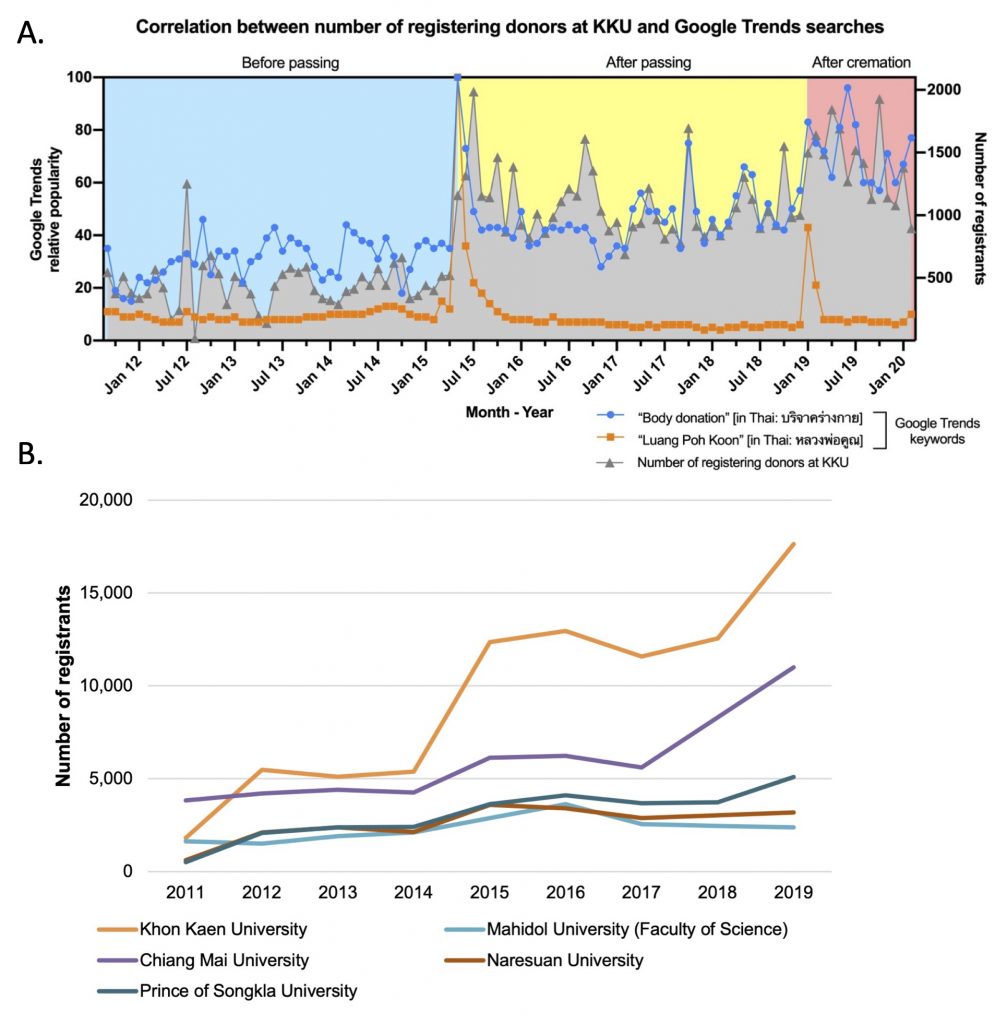Highlight
หลวงพ่อคูณส่งผลให้การบริจาคร่างกายในประเทศไทยเพิ่มขึ้นถึง 1.5 เท่าในช่วง 3 ปีหลังการบริจาคร่างกายของท่าน งานศึกษานี้เน้นถึงบทบาทของผู้นำศาสนาในการส่งเสริมการบริจาคร่างกายเพื่อการศึกษาและการวิจัยทางการแพทย์

ที่มาและความสำคัญ
การบริจาคร่างกายเพื่อการศึกษาและการวิจัยมีบทบาทสำคัญในการฝึกอบรมนักศึกษาแพทย์และพัฒนาการผ่าตัด แม้จะมีวิธีการทดแทน เช่น โมเดลดิจิทัล แต่การใช้ร่างกายจริงยังคงได้รับความนิยมมากกว่าในด้านการส่งเสริมความเข้าใจทางกายวิภาคและการสร้างคุณธรรม เช่น ความเห็นอกเห็นใจ การศึกษาเหตุการณ์ในประเทศไทยเกี่ยวกับการบริจาคร่างกายของหลวงพ่อคูณ ปริสุทฺโธ พบว่ามีผลกระทบอย่างมากต่อการกระตุ้นให้ประชาชนสนใจบริจาคร่างกาย โดยหลังจากที่หลวงพ่อคูณบริจาคร่างกายเพื่อการศึกษาเมื่อปี พ.ศ. 2558 มีอัตราการลงทะเบียนบริจาคเพิ่มขึ้น 1.5 เท่าในช่วง 3 ปีถัดมา เหตุการณ์นี้เน้นถึงผลกระทบของการบริจาคร่างกายของท่านในการส่งเสริมการบริจาคเพื่อประโยชน์ทางการแพทย์
Abstract
In this letter, we share compelling insights from a recent study that underscores the profound influence of religious figures on promoting body donations, as illustrated by the case of the late Luang Phor Koon in Thailand in Thailand. After his demise on May 16, 2015, and subsequent donation of his body to Khon Kaen University for medical education, there was a significant surge in public interest and participation in body donation programs across Thailand.
We utilized Google Trends and analyzed data from various medical institutions in Thailand to assess the impact of Luang Phor Koon’s donation, particularly at Khon Kaen University. The results reveal a remarkable 1.5-fold increase in donor registrations at Khon Kaen University in the three years following his passing, compared to the preceding period, correlating with peaks in online searches for ‘body donation’ and ‘Luang Phor Koon’ (https://doi.org/10.6084/m9.figshare.26265074). This uptick was reflected nationwide, with the number of donor registrations at six medical schools across Thailand increasing by up to two-fold. Such data clearly highlight a national movement inspired by a revered religious leader.
In response to the increasing demand for cadavers, accentuated by the rising number of medical schools, we propose several strategies to boost donor numbers effectively. These include collaborating with influential community figures, engaging with religious leaders to endorse body donation culturally and spiritually, and recognizing donors and their families through various means such as remembrance ceremonies or plaques.
In conclusion, the example set by Luang Phor Koon not only fostered a significant increase in body donations in Thailand but also highlighted the potential of religious and cultural influence in enhancing medical education and research. It is imperative for anatomy departments worldwide to consider these findings and integrate similar culturally respectful approaches to encourage body donations, thereby securing a sustainable future for medical education.
KEYWORDS: Body donation, Medical education, Religious leader
Citation: Chaiyamoon, A., Yurasakpong, L., Mo-Thong, W., Kaewborisutsakul, W. K., Mahakkanukrauh, P., Putiwat, P., Tubbs, R. S., Iwanaga, J., & Suwannakhan, A. (2024). Impact of a religious leader on body donation trends: Insights from a recent event from Thailand. Medical Teacher, 46, 1517–1518.
DOI: https://doi.org/10.1080/0142159X.2024.2382481
RELATED SDGs:
3. GOOD HEALTH AND WELL-BEING

ผู้ให้ข้อมูล: ผู้ช่วยศาสตราจารย์ ดร.อธิคุณ สุวรรณขันธ์
ชื่ออาจารย์ที่ทำวิจัย: ผู้ช่วยศาสตราจารย์ ดร.อธิคุณ สุวรรณขันธ์, อาจารย์ ดร.ลภัสรดา ยุรศักดิ์พงศ์
Credit ภาพ: ผู้ช่วยศาสตราจารย์ ดร.อธิคุณ สุวรรณขันธ์
Webmaster: ว่าที่ ร.อ. นเรศ จันทรังสิกุล
